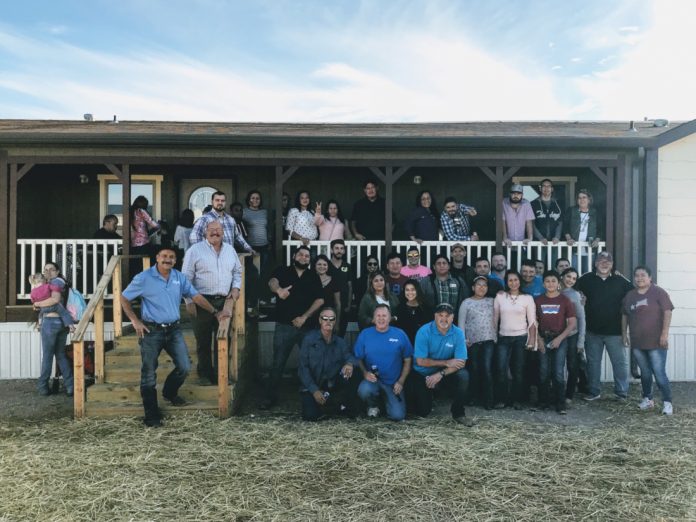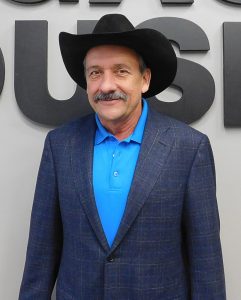
Kenny Shipley, co-founder and CEO of Legacy Housing, watched the Bedford, Texas, company he started in 2005 with Executive Chairman Curtis Hodgson go public (LEGH) in early 2019.
Some might say it’s a long road from West Texas to Wall Street. They have no idea.
That trip will take 24 hours of highway driving, if it’s all about the destination. But, if you’re Kenny Shipley, it’s about the process. It’s about trust. It’s about doing the right thing, with a “burn in your belly”. And if that’s the route you take, the travel from West Texas to Wall Street takes 14 years or more. Maybe a lifetime, if you ask Kenny.
Let’s Start with the ‘World Famous Pecos Cantaloupe’
Shipley has done quite a few things in his life, including sell plenty of homes. However, before there were homes to sell, there was a ripe West Texas melon travelers would take a U-turn to obtain.
Shipley and his brothers, Billy and Doug, would make the three-hour ride to Pecos, Texas, for no other reason than to load up on whole, locally grown fresh cantaloupe. It’s a sensitive crop, and timing was everything, he said.
“In Pecos, it’s such a dry, sandy heat, and they just grow so sweet,” Shipley explains, as if he’s tasting a cantaloupe in the very moment he’s talking about it. “They are delicious, and you can see it. They’re bright orange.
“You needed to pick them at just the right time. Not too early, and you can’t keep ’em on the vine in the heat. We had it down.”
The sign they rigged up on route 114 to Lubbock read “Pecos Cantaloupe. World Famous”. They’d sell them out of the back of the truck. Then, in the heat of the day or when restlessness took over, the trio and whatever friends they could recruit would take the melons to local markets. Shipley would even take the juicy treasures door-to-door throughout his hometown of Levelland, population 8,000 at the time, 30 miles west from Lubbock.
“I’d take a cut of cantaloupe door-to-door,” Kenny Shipley said. “‘Taste this, they’re world famous’. People would say, ‘Man that’s good’. We’d sell two for a dollar. We’d load up that truck from Pecos for six cents a pound, so we did OK.”
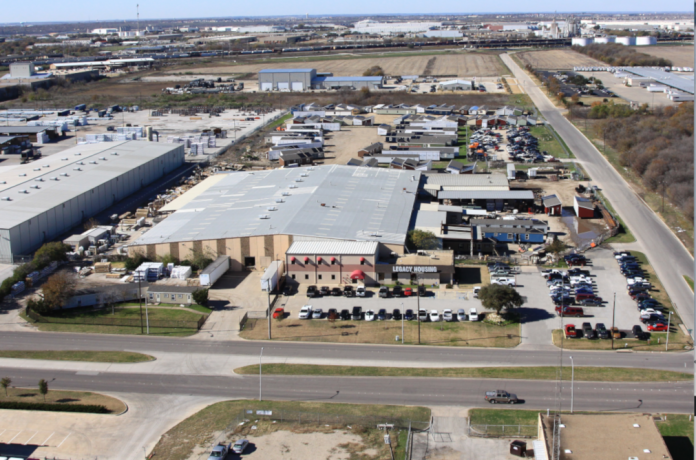
‘Everything We Got, We Worked For’
“My dad taught us how to be entrepreneurs, and we were always hustling,” Shipley said of he and his siblings.
He said not one of them has ever filled out a W-2 in their lives. They worked for themselves, they worked hard, and they made money.
“We ran gasoline stations for a bit when we were right out of high school,” he said.
“We’d buy used batteries for $1, and put them all on a train charger. It charges 10 batteries at a time,” he said. “We’d charge them for a couple hours and see if any of them held a charge, and spray them and clean them up to look like new. We’d sell the good ones for $19.95, and the others we’d sell for junk at $5.”
They’d also buy imported wristwatches for $1.75 and sell at the gas station for $20. Like anything else, you’d keep some of the profit and put the rest back in the business. Or a business, whatever made sense.
Their father was in the car business, so Kenny and his brothers always had a few lessons to lean on as they built their own ventures.
“We didn’t have a lot, but it could have been a lot worse,” he said.
The Shipleys moved to Levelland from a town that was just a little smaller. He said West Texas was a fun place to grow up, a safe place where kids could be kids.
“We had two pool halls, a roller rink, two movie theaters, a drive-up theater, two city swimming pools… You knew everyone in the area, and we always would hang out in our garage because we had a pool table,” Shipley said. “We didn’t have a door key for our house. We’d go out of town for three or four days and just leave it open. It was that kind of town.”
They’d have football games with 25 people on each side. They rode bicycles everywhere.
“Of course, there were no computers or video games, so if you wanted to have fun you had to go outside. And I’m grateful for that,” Shipley said.
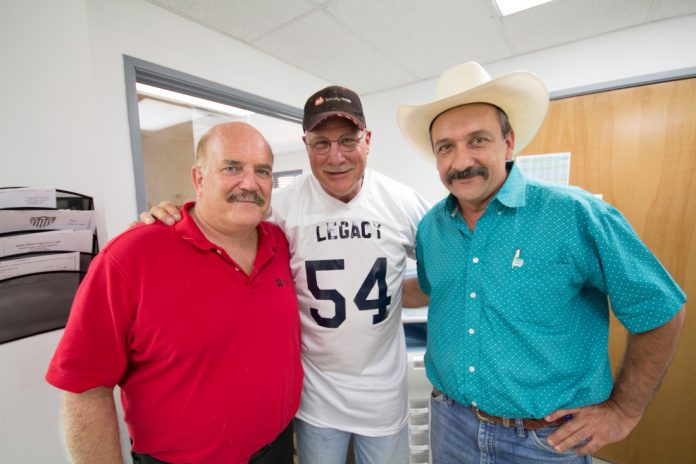
When It Comes to Housing
Shipley and his brothers had been dabbling in manufactured housing for a few years at the time they went in together and started a retail business. Bell Mobile Homes in Levelland has been operating for 38 years now.
“When I got in, the industry was moving 300,000 homes, and interest rates were 23 percent,” Shipley said. “I was doing 23 percent loans through GE Credit.”
But times would change, and fast, particularly in West Texas.
Shipley and Hodgson crossed paths in the mid-’80s. They were both buying repossessed homes and selling them, including to other retailers.
The manufactured housing business was down-trending from the peak years of the 1970s. To further distress the Texas market, oil by the barrel was way down, to $8 per barrel in the mid-’70s. There was a massive effect on the labor market, which particularly affected housing.
Banks went under in droves. Any area MH financing was in operation was east of Interstate 35.
“West Texas was cut off,” Shipley said. “There were no finance companies doing business west of I-35.
“For us to survive, we would get bank financing or sell ’em for cash. I met Curt (Hodgson), and we were competing for many houses,” he said. “One day we kind of started buying and selling to each other, and we slowly started partnering up on a pile of houses.”
Hodgson was in retail and running auctions, and Shipley would enter his homes in the auction. They ran that way for two decades, working hard and making ends meet.
Legacy Housing Fact Box
- Legacy went public in February 2019
- Has three manufacturing facilities, including its original in Fort Worth
- It is the fourth largest builder of manufactured homes in the U.S.
- Offers customers 70 floor plans, including tiny homes
- Delivers to 14 states from the Southwest to Southeast
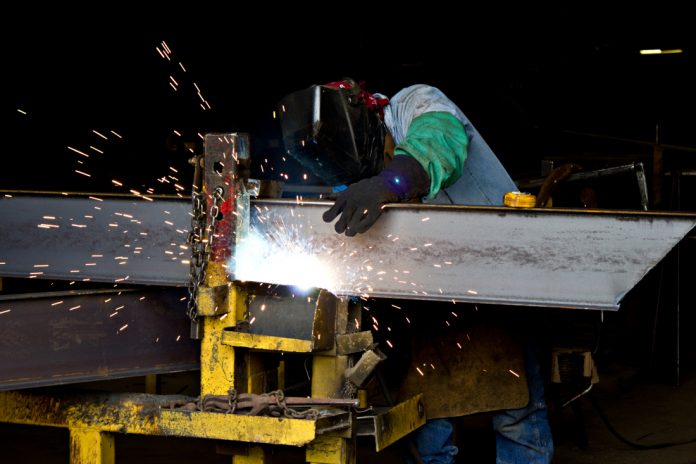
A Little Bit Closer to Wall Street
The pair had purchased and sold enough homes, and built enough relationships, that eventually the two entrepreneurs came around to talking about building their own homes. They had the experience, the work ethic and enough capital resources to make it happen. They only needed to formalize a plan.
“We didn’t even have a contract or official partnership, not until we started Legacy,” Kenny Shipley said. “That was the first time we signed anything. We had bought a Cavalier plant. We were already buying inventory at that point. Floorplanning inventory, that’s how we got started.
“We had 40 guys doing business with us,” he added. “They had sales centers, and they believed in us. Then we started building homes, too.”
Initially, the pair wanted to keep the homes “low end”. The idea was to keep them basic to build and simple to sell. They had one 16×60’ floor plan they built for the first 90 days. Then they added in a 16×80’ that brought them out to about six months in business. After that, they started building and selling double wides.
“We built it organically,” Shipley said. “We build our own roof trusses, we laminate our sheetrock. And we profile our trim. We’ve done a good job of taking the middlemen out of what we do. And we’ve had to do that to compete with the big boys. We go to China to do our own importing. Our product is the same product because we were already buying from China, we just cut the middleman out who was taking 25-30 percent.”
The pair, and their team at Legacy Housing, which now numbers more than 800 employees, built the business up well enough and continue to have strong enough confidence in their product to have started their own retail finance program.
“We’re not the answer to everyone’s prayers, so there’s still that need for the other lenders, but we have our niche,” Shipley said. “We build the widest floor, the highest roof. We deliver the most bang for the buck for the consumer, kind of like that Pecos cantaloupe.”
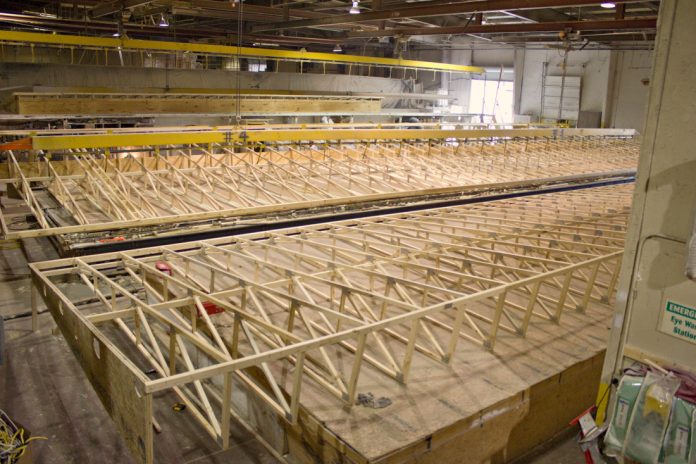
Focus on the Best Product, and Build a Network
As much as he loves building homes, Shipley still has a soft spot for the retail end of the business: the independent retailer, the entrepreneur.
“It’s a gamble every day when you wake up and have no idea where your dollar is coming from. That’s the case with our network, from Colorado to Kansas to Florida,” he said. “We love the independent guys. That’s what built America.”
Shipley said he and Hodgson agree, they cannot think of any two industry professionals who have created more business by setting up independent dealers. Legacy Housing currently operates through an independent dealer network of better than 100 retailers.
“I truly believe we’ve put more people in business than anyone else. We’re always going to support independent dealers. Those are the guys we want to do business with,” he said.
“Anyone can have a sales center and make money. You need to have that burn in your belly. If you don’t, you probably can’t, but if you have that dream and the burn in your belly, you’re going to do it.”
Where Ya Headed?
Shipley and others at Legacy Housing are asked quite often if the manufactured housing industry can reach its peak sales volume again. More than 400,000 homes shipped in a year? That’s more than quadruple the current production, in an industry already on an assertive upward trajectory.
“I don’t think so,” Shipley says, hesitantly. “Too many independents left, and not too many are getting back into it. There are no families getting in, and of course there are families aging out.”
True, the housing crisis and credit crunch pushed droves of traditional retailers out of business. Which leaves factories with fewer places to send homes and buyers with less obvious places to shop. Much of the sales recovery in the industry has come through community operators that now sell homes as well.
Take note, though, Kenny Shipley still hands out his business card. “I can help” is what it says, right beside his cell phone number.
In the meantime, Legacy is pleased to build its own business, and continue its own, well, legacy.
If Not by Road, Then By Air (or Heir)
Kenny Shipley’s always working. Checking on retailers. Walking the floor. Responding to sometimes 80 phone calls a day. But he still lives in Levelland, now population 13,000 or so. It’s 275 miles by air to the original factory in Fort Worth.
“I’m a pilot,” Shipley states.
He has been flying since the age of 17; earned his license at about 20 years old. He took a long number of years off when his children were young, but bought an airplane in the mid-’90s. He’s been flying to the plant two, three times a week ever since.
“We both fly a Meridian jet prop,” Kenny Shipley said of himself and Hodgson. “His is blue, mine’s red.”
They’re personal planes, Shipley’s quick to point out. The company didn’t buy them. They’ve always kept a low profile, he said, and particularly so now.
“We’re working with shareholder money now, and we consider our shareholders as partners,” he said. “We are going to treat their money like it’s our money. We’re not going to be frivolous.”
Kenny Shipley’s son, Ken, followed him into the family business. Ken started at age 16 in the setup department. A decade later he leads sales.
“He’s a better salesman than I was,” Shipley admitted. “He’s a natural.”
Now that’s a legacy.

